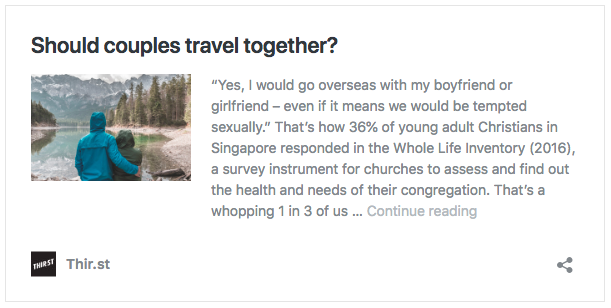Last year, a colleague of mine published a controversial article titled Should couples travel together.
It drew many differing opinions: Some thought that it needed to be heard, while others thought the piece sounded condemning. When I showed my boyfriend the article, his reaction was not unlike those who disagreed with the article: “It’s not like you’re only tempted when you’re overseas.”
Recently, Rice Media has explored how the word “staycation” has become synonymous with “sex” to Singaporean youths today. Driven by a lack of privacy, time and money, many today choose to book boutique hotels in Singapore – a cheaper alternative to overseas vacations for seclusion and privacy.
What if I told you there’s a better and more foolproof way to “test waters” – one you don’t have to cross oceans for?
So if we’re talking about temptation, one doesn’t necessarily have to travel far for it to happen – temptation occurs all the time.
The common rebuttal is that not everyone goes on staycations and vacations with the sole intention to have sex.
One Tripzilla columnist puts it this way: “Couple travel allows for experimentation, growth and the enrichment of one’s horizons. In addition, you get to do things the both of you love and make lifelong memories with each other.”
Even a friend of mine advised me to travel with my boyfriend at least once before getting married. According to her, that would let me “test” what living with him is like before making a lifelong commitment.
 These are all thoughts that I’ve had as well.
These are all thoughts that I’ve had as well.
I would love to spend exclusive time with my boyfriend, and I do hope that our living habits are compatible with each other’s. But to us, travelling together or enjoying a staycation is a no-go simply because of the risks involved.
Most of us may not go holidaying with our partner with the intention to cross physical boundaries – but many of us just don’t know how strong temptations can be.
My mentor told me: “As a couple, you guys will be getting closer emotionally, mentally and spiritually, and yet physical intimacy is something that you guys have to withhold yourselves from. It’s going to be difficult.”
If we’re really being honest, temptation is strong enough right where we are – what more the seclusion of a private island or romantic city overseas?
I recently celebrated my one year anniversary with my boyfriend. While Instagram highlighted the happy moments of our date, it didn’t quite capture the whole picture. The truth is, we experienced some tension during our celebration and had a serious talk about our disagreements.
“Isn’t it remarkable how happiness can be marked with mundane… but also tense moments?” I asked at the end of the date.
“Just because we have conflicts doesn’t mean we are unhappy,” he replied. “They are just disagreements. We just have to find ways to resolve them.”
I thought about what he said and thought about how even though we were initially attracted to each other because of our similarities, more and more differences had begun to surface as time passed.
But I looked at the man standing in front of me and decided that I didn’t love him any less. For all the ups and downs, we were still very much in love.
I learnt an important lesson that night: As a relationship progresses, the question we ask ourselves has to progress from “Are we compatible with each other” to “How do we resolve our differences”?
I’m saying this because many couples want private time together like on vacations, staycations or even cohabiting with each other for a period – hoping to learn if they can live with their partner. But this is a risky experiment that can come with a price tag and lasting consequences.
What if I told you there’s a better and more foolproof way to “test waters” – one you don’t have to cross oceans for?
Differences and conflicts are bound to show up no matter how compatible you are with your partner. And while it is important to find someone who can complement your core beliefs and values, what matters when it comes to friction is how you resolve differences.
So why should we act like we’re married when we’re not? Why the need to play pretend when the daily interactions between each other already tell us a lot about the relationship? Why should we place ourselves in a vulnerable position, setting ourselves up to fail in purity, when we can learn from a much safer place?
The common argument is that if a couple wants to have sex, they will do it regardless of the place they’re in. Maybe. But if we genuinely care about values like chastity or purity, then I think it’s a lot wiser and humble to assume that we are fundamentally up to no good.
From there we can then honestly ask ourselves, what is it that we really want out of a staycation or vacation with our boyfriend or girlfriend – and if that “prize” is worth the rebellion and all the risks.










